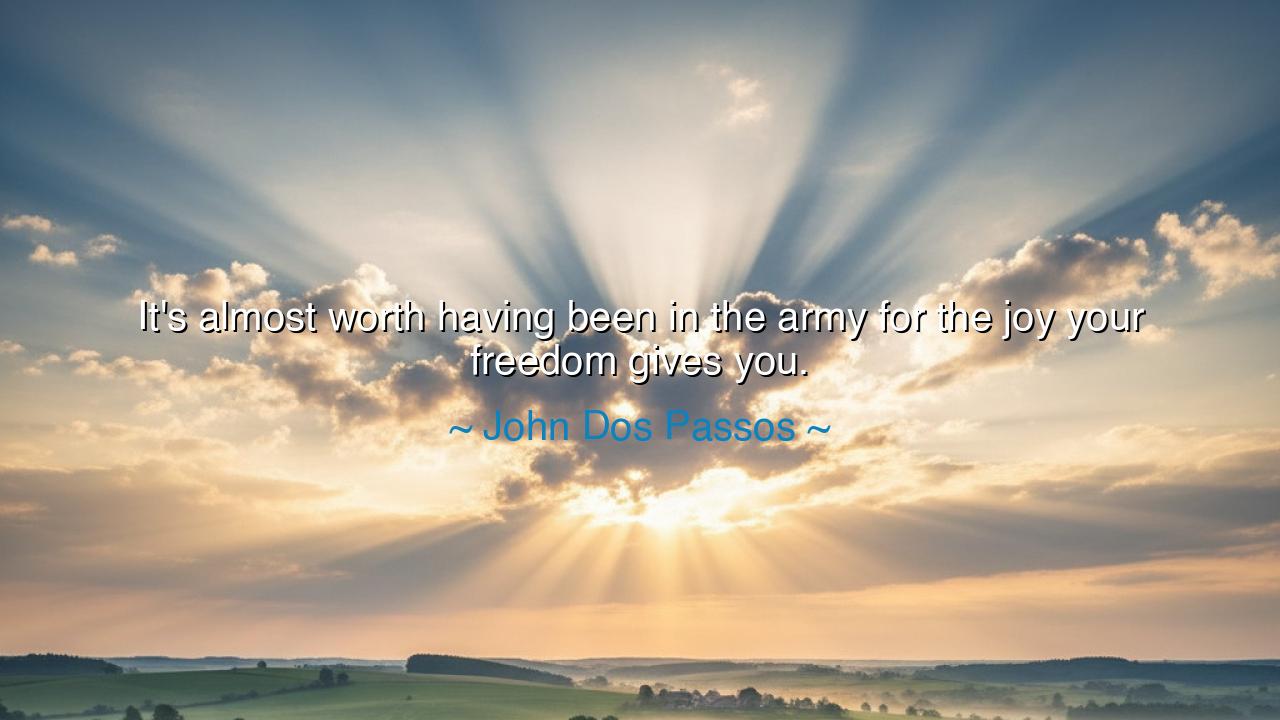
It's almost worth having been in the army for the joy your






“It’s almost worth having been in the army for the joy your freedom gives you.” So wrote John Dos Passos, soldier, writer, and witness to the great upheavals of the twentieth century. In this brief yet profound saying lies the paradox of service: that one must sometimes taste the loss of liberty in order to know its sweetness. For those who have lived under command, whose days were ruled by orders and discipline, the return to freedom is not a mere condition of life—it is a revelation, a joy, a treasure beyond price.
The meaning of this quote flows from the heart of human experience. Many who live always in liberty forget its weight and beauty. They take for granted the ability to speak, to move, to choose, and to dream. But for the soldier, whose every act is bound by duty, who must obey without question and endure hardship without complaint, the absence of freedom becomes a daily companion. When such a one at last steps again into the wide air of liberty, the joy is magnified a hundredfold. Dos Passos reminds us that sometimes the loss of a thing teaches us its true worth.
We see this truth echoed in countless lives. Consider the men of World War I, of which Dos Passos himself was a part. They endured mud-filled trenches, endless commands, and the constant shadow of death. When the war ended and they returned to civilian life, the simple acts of walking unbidden through a street, of resting without orders, of speaking without fear—these became radiant experiences. The joy of freedom was heightened by the memory of its absence. What to others was ordinary became to them sacred.
This lesson is not bound to soldiers alone. Think of Nelson Mandela, who spent twenty-seven years in prison, denied the simplest liberties. When at last he was freed, he spoke of the deep sweetness of walking beneath the open sky, of feeling the grass underfoot. To those who had always known freedom, such things were ordinary. To Mandela, they were miracles. His life, like Dos Passos’s words, proclaims that the greatest treasures are often invisible until we are deprived of them.
The wisdom here is timeless: freedom is never to be taken lightly. It is not merely the absence of chains, but the presence of dignity, choice, and the right to live fully as oneself. Those who have lost it understand this most deeply; those who have never lost it must be reminded. Dos Passos’s words serve as such a reminder, calling us to cherish what we might otherwise overlook, to guard with vigilance what has been bought with sacrifice.
The lesson for us is clear: live daily with gratitude for liberty. Do not squander it on selfishness, nor weaken it by neglect. Recognize that the freedom to speak, to worship, to labor, to love, and to dream is not common across all lands nor guaranteed for all times. It must be cherished, protected, and passed down with reverence. Soldiers, prisoners, and all who have endured loss remind us of this duty.
Practically, this means living with both gratitude and responsibility. Give thanks each day for the choices you possess, however small. Defend the liberties of others, even when they differ from you. Do not allow convenience or fear to erode the foundations of freedom. Remember always that others have suffered under the weight of its absence so that you may enjoy its abundance.
Thus, let Dos Passos’s words echo in your heart: “It’s almost worth having been in the army for the joy your freedom gives you.” Let them remind you that liberty is not cheap, nor ordinary, nor guaranteed. It is the sunlight after the storm, the breath after suffocation, the release after captivity. Treasure it, defend it, and live within it with gratitude—for freedom is both the crown of life and the burden of duty.






AAdministratorAdministrator
Welcome, honored guests. Please leave a comment, we will respond soon